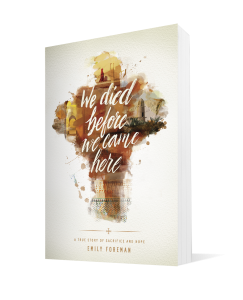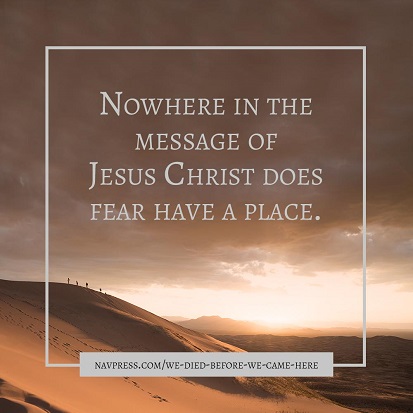“Are we transferring fear to our new brothers and sisters by valuing security above the Gospel and living a lifestyle of ‘safety first’? Nowhere in the message of Jesus Christ does fear have a place. Wouldn’t we be contaminating the message of Christ if we allow our own fear to dictate our level of obedience to God? It seems to me that we can’t encourage boldness unless we first exemplify it ourselves.” – Stephen Foreman, missionary and martyr in northern Africa.
Fear was one of the major spiritual strongholds over the nation. We prayed against it constantly. And fear was definitely one of the biggest roadblocks to the growth of the small community of local believers—and for good reason. Christians in closed countries like this suffered persecution we know nothing of in America. In this country there were only two choices: be a Muslim—or risk the loss of your job, your family, and potentially your life. Of course our friends were afraid. But we knew the church would not grow until they were willing to push forward in the face of persecution. Not out of recklessness, but as wise as serpents and gentle as doves. Out of love for God and those around them.
We tried to inspire our friends, but though we faced our own fair share of fears and risks and even hardships, our reality was very different. We at least had the full backing of our family and supporters back home—and we were free to be Christians in America and in the Musli m world. It was one thing to talk about being bold and courageous in face of persecution, but did we have any real authority on the subject? How could we model this principle when we weren’t personally faced with being disowned by our parents or losing our means of feeding our children? Encouragement would only go so far—God would have to stir his people to boldness.
m world. It was one thing to talk about being bold and courageous in face of persecution, but did we have any real authority on the subject? How could we model this principle when we weren’t personally faced with being disowned by our parents or losing our means of feeding our children? Encouragement would only go so far—God would have to stir his people to boldness.
We didn’t have peace about the persecution of our local brothers and sisters. We knew it was inevitably going to be difficult for them, but was their only choice in following Jesus to disassociate with their family and lose their cultural identity? How would the light spread that way? Wasn’t God just as passionate about redeeming their families? Even in the midst of persecution, the persecutors may be the opposition, but they are not the enemy. There had to be a way for our friends to stay in their context and follow Christ without outright dishonoring their families. These were the questions that consumed our conversation and prayers many nights as we lay in our quiet room, unable to sleep.
Continue reading the free first chapter of We Died Before We Came Here by Emily Foreman

